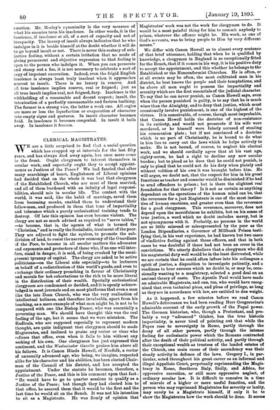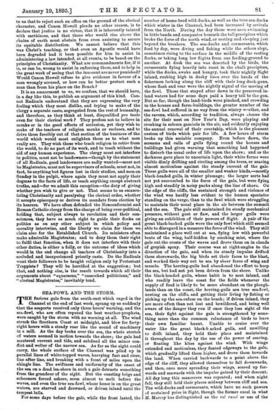CLERICAL MAGISTRATES.
WE are a little surprised to find that a social question which has cropped up at intervals for the last fifty years, and has always died away again, has once more come to the front. Ought clergymen to interest themselves in secular work, and especially ought they to accept appoint- ments as Justices of the Peace ? We had fancied that after many searchings of heart, Englishmen of Liberal opinions had decided that on the whole it was best that clergymen of the Established Church, who are most of them married, and all of them burdened with an infinity of legal responsi- bilities, should mix in secular life. The contact with the world, it was said, like the habit of marriage, saved them from becoming monks, enabled them to understand their fellow-men, and produced in them that tone of impartiality and tolerance which a purely ecclesiastical training tends to destroy. Of late this opinion has even become violent. The clergy are not so much advised as required to "serve tables," —to become, that is, the agents of what is termed the " Christian," and is really the Socialistic, treatment of the poor. They are adjured to fight the squires, to promote the sub- division of land, to resist the narrow economy of the Guardians A the Poor, to become in all secular matters the advocates and exponents and protectors of those who, if no one will inter- fere, stand in danger, it is said, of being crushed by the omni- present tyranny of capital. The clergy are asked to be active politicians—on the Liberal side especially—to be lecturers 311 behalf of a redistribution of this world's goods, and even to exchange their ordinary preaching in favour of Christianity and morals for hot exhortations to the rich to be more liberal in the distribution of their wealth. Specially ecclesiastical clergymen are condemned or derided, and it is openly acknow- ledged in most journals and on most platforms that even a man like the late Dean Church, who was the very realisation of intellectual holiness, and therefore invaluable, apart from his teaching, as a mere example of what men might be, is not to be compared with one like Bishop Fraser, who was essentially a governing man. We should have thought this was the real feeling of the age, but it seems that we were mistaken. The Radicals, who are supposed especially to represent modern thought, are quite indignant that clergymen should be made Magistrates, and inclined to praise any rector or vicar who refuses that office, even when it falls to him without any seeking of his own. One clergyman has just expressed this sentiment, and the Westminster Gazette praises him above all his fellows. It is Canon Hinds Howell, of Norfolk, a rector of unusually advanced age, who being, we imagine, respected
alike for his character and his abilities, has been elected Chair- ,man of the Council of his district, and has accepted the appointment. Under the statute he becomes, therefore, a Justice of the Peace, and this is his comment upon that fact : "He would have to go to quarter sessions to qualify as a Justice of the Peace; but though they had elected him to that office, he assured them that it would be the first and the last time he would sit on the Bench. It was not his intention to sit as a Magistrate. He was firmly of opinion that Magistrates' work was not the work for clergymen to do. It would be a most painful thing for him to commit anybody to prison, whatever the offence might be. His work, as one of God's servants, was to bring people to Him by very different means."
We differ with Canon Howell as to almost every sentence of that brief utterance, holding that when he is qualified by knowledge, a clergyman in England is so exceptionally fitted for the Bench, that if it comes in his way, it is his positive duty to accept the appointment, and this whether he belongs to the Established or the Nonconformist Churches. He is often, or at all events may be often, the most cultivated man in his district, he best knows the people and their temptations, and he above all men ought to possess the impartiality and serenity which are the first essentials of the judicial character. To say that he can never punish, as Canon Howell says, even when the person punished is guilty, is to say that he is much wiser than the Almighty, and to deny that justice, which must occasionally involve punishment, is one of the highest of the virtues. It is conceivable, of course, though most improbable, that Canon Howell holds the doctrine of non-resistance in its entirety, and would not prosecute if his wife were murdered, or he himself were falsely accused of stealing his communion plate ; but if not convinced of a doctrine which is no part of Christianity, he is bound to do what in him lies to carry out the laws which he helps actively to make. He is not bound, of course, to neglect his clerical work, and we should cordially agree that at his vast age, eighty-seven, he had a right to decline any new secular burden ; but to plead as he does that he could not punish, is only to plead that he could not do his duty when plainly and without volition of his own it was brought before him. He will argue, we doubt not, that the respect for him in his great functions as teacher and consoler would be diminished if he had to send offenders to prison ; but is there the slightest real foundation for that theory ? Is it not as certain as anything dependent on the operations of the human mind can be, that the reverence for a just Magistrate is one of the most instinc- tive of human emotions, and greater even than the reverence for a good clergyman This reverence, moreover, does not depend upon the mercifulness he exhibits, but on his sense of true justice, a word which no doubt includes mercy, but is not synonymous with it. Probably, no persons in the world are so little misread or misrepresented by the poor as the London Stipendiaries, a Governor of Millbank Prison testi- fying that, in his vast experience, he had known but two eases of vindictive feeling against those officers, and that in both cases he was doubtful if there had not been an error in the convictions. We utterly disbelieve that a clergyman who did his magisterial duty well would be in the least distrusted, while we are certain that be could often infuse into his colleagues a spirit of justice, a disposition to investigate patiently, and a readiness to hear excuses which no doubt is, or may be, occa- sionally wanting to a magistracy, selected a good deal on an ancient theory of caste. The Apostle Paul would have made an admirable Magistrate, and one, too, who would have recog- nised that even technical pleas, and pleas of privilege, so long as they are in accordance with law, are entitled to due weight.
As it happened, a few minutes before we read Canon Howell's deliverance we had been reading Herr Gregorovius's admirable account of the early growth of the Papal power. The German historian, who, though a Protestant, and pro- bably a vely "advanced" thinker, has the true historic impartiality, is never tired of pointing out that while the Popes rose to sovereignty in Rome, partly through the decay of all other powers, partly through the intense feeling for ecclesiastic power which the Romans contracted after the death of their political activity, and partly through their exceptional wealth as trustees of the landed estates of the Church, one main cause of their ascendency was their steady activity in defence of the laws. Gregory L, in par- ticular, acted throughout his great career as an informal and illegal Appellate Court, perpetually reprimanding the Magis- tracy in Rome, Southern Italy, Sicily, and Africa, for oppressive execution, or still more oppressive neglect, of ordinary secular law. It is difficult to conceive in a time of misrule of a higher or more useful function, and the person who may reprimand Magistrates for severity or laxity, may surely be a Magistrate himself, if only it be to show the Magistrates how the work should be done. It seems
to us that to reject such an office on the ground of the clerical character, and Canon Howell pleads no other reason, is to declare that justice is no virtue, that it is inherently tainted with earthiness, and that those who would rise above the chains of earth must abstain from even assisting to secure its equitable distribution. We cannot believe that this was Christ's teaching, or that even an Apostle would have been degraded had it been possible for him to assist in administering a law intended, at all events, to be based on the principles of Christianity. What are commandments for, if it is, or can be, wrong to assist in enforcing them, and to help in the great work of seeing that the innocent are never punished? Would Canon Howell refuse to give evidence in favour of a man wrongly accused, or how can he better protect such a man than from his place on the Bench P
It is an amazement to us, we confess, that we should have, in a day like this, to publish an argument of this kind. Can- not Radicals understand that they are expressing the very feeling which they most dislike, and trying to make of the clergy a separate caste, segregated from the rest of humanity, and therefore, as they think at least, disqualified pro tanto even for their clerical work P They profess not to believe in monks or in the good effects of seclusion, yet they wish to make of the teachers of religion monks or recluses, and to drive them forcibly out of that section of the business of the world which would most enlighten them as to what men really are. They wish those who teach religion to retire from the world, to do no part of its work, and to teach without the aid of any human experience. The clergy must not interfere in politics, must not be landowners—though by the statement of all Radicals, good landowners are sadly wanted—must not be Magistrates, must not be supervisors of schools, must not, in fact, be anything but figures lost in their studies, and seen on Sunday in the pulpit, where again they must not apply their dogmas to the facts of life, or teach anything except abstract truths, and—for we admit this exception—the duty of giving whether you wish to give or not. That seems to us emascu- lating Christianity and paralysing the clerical order, whether it accepts episcopacy or derives its mandate from election by its hearers. We have often defended the Nonconformist and Roman Catholic clergy from the charge of being over-political, holding that, subject always to revelation and their con- sciences, they have as much right to guide their flocks on politics as on any other subject in which policy and morality intertwine, and the liberty we claim for them we claim also for the Established Church. Its ministers often make admirable Magistrates; and to deny them their right to fulfil that function, when it does not interfere with their rother duties, is either a folly, or the outcome of ideas which would in the end change all teachers of Christianity into a -secluded and inexperienced priestly caste. Do the Radicals want their followers to be taught religion only by Protestant Trappists P They will be horrified at the suggestion ; but that, and nothing else, is the result towards which all their arguments about "squarsons," "cassocked politicians," and -"clerical Magistrates," inevitably tend.



































 Previous page
Previous page